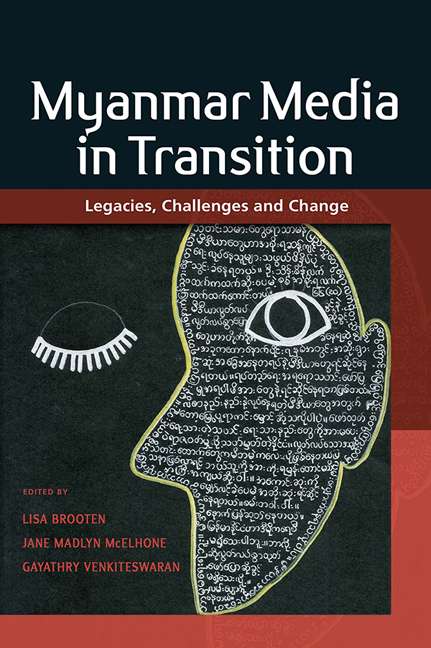Book contents
- Frontmatter
- Contents
- Contributors and Editors
- Burma or Myanmar? A Note on Terminology
- 1 Introduction: Myanmar Media Historically and the Challenges of Transition
- Part I Structural Constraints and Opportunities
- Part II Journalism in Transition
- Part III Creative Expression
- 14 Myanmar's Pop Music Industry in Transition
- 15 New Video Generation: The Myanmar Motion Picture Industry in 2017
- 16 Films for Dignity
- 17 A “Fierce” Fear: Literature and Loathing after the Junta
- Part IV Society and Media
- Epilogue: Media Studies in Myanmar – Where Do We Go from Here?
- Index
17 - A “Fierce” Fear: Literature and Loathing after the Junta
from Part III - Creative Expression
Published online by Cambridge University Press: 07 September 2019
- Frontmatter
- Contents
- Contributors and Editors
- Burma or Myanmar? A Note on Terminology
- 1 Introduction: Myanmar Media Historically and the Challenges of Transition
- Part I Structural Constraints and Opportunities
- Part II Journalism in Transition
- Part III Creative Expression
- 14 Myanmar's Pop Music Industry in Transition
- 15 New Video Generation: The Myanmar Motion Picture Industry in 2017
- 16 Films for Dignity
- 17 A “Fierce” Fear: Literature and Loathing after the Junta
- Part IV Society and Media
- Epilogue: Media Studies in Myanmar – Where Do We Go from Here?
- Index
Summary
In the surrounding darkness, bright lights focus on the speaker on the stage, a famous writer. The noise of an electric generator competes with his voice. He uses vivid metaphors to illustrate the wrongdoings of those in parliament and the government. The audience responds with a roar of cheers and applause: “Yes, they are idiots! Curse them some more!”
The speaker needs to wait a while for the people to calm down. But soon enough, words from his speech hit a nerve once again, and the audience goes wild.
This is a typical scene at literary talks in Myanmar. Historically, such talks were a traditional affair that became popular during Myanmar's colonial days, but they were unofficially banned by the military junta during its rule. Though they have once again become popular since the relaxation of restrictions in 2010, most attendees have never before experienced such events. In fact, the audience, especially those from rural areas, has had no exposure to literature at all, given the overwhelming censorship during the junta years.
Even among users of social media — who are likely to be urban, well off and with greater exposure to literature — it is clear that awareness of different literary forms is low. So much so that posts on online forums such as Facebook often include the disclaimer, “The following is a satire. Please don't take it seriously before you make (terrible) comments.”
A History of Repression
This lack of awareness is a reflection of how the dictatorship crippled literature, the arts and media. From 1962 until 2000, all major print and broadcast media were owned by the state. The small-scale private media covered uncontroversial topics such as music, celebrity news, entertainment and sports. As a result, many citizens — including some writers — think the media are merely a tool to be used as a weapon for shaming or for propaganda. People also underestimate their own right to information, and the role of the media in ensuring this right. State media were used for government propaganda, and the media in exile turned into activist media determined to counter heavy censorship and the severe forms of control that stymied access to stories. In taking on the role of promoting democracy, the media in exile often lapsed into anti-government propaganda.
- Type
- Chapter
- Information
- Myanmar Media in TransitionLegacies, Challenges and Change, pp. 315 - 324Publisher: ISEAS–Yusof Ishak InstitutePrint publication year: 2019



